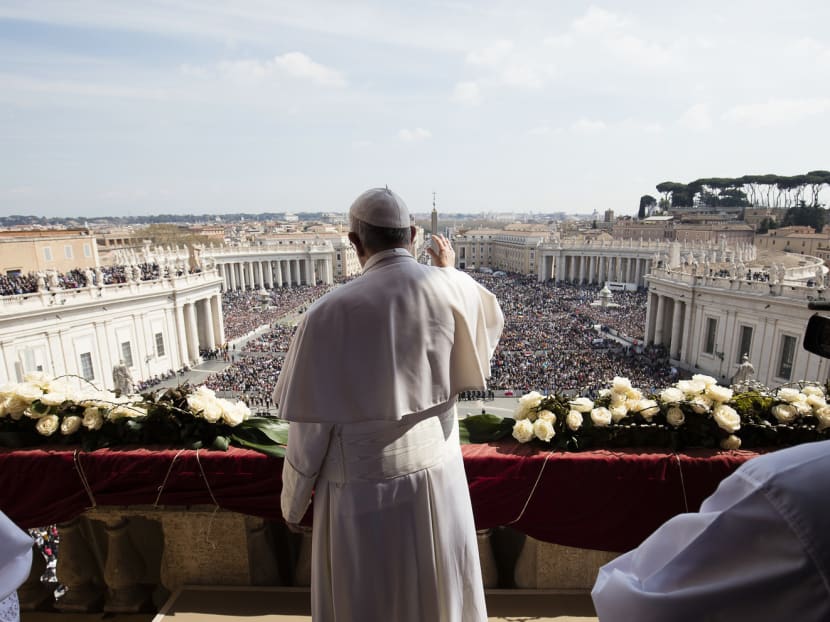A change of Catholic tone towards the family
Pope Francis has finally spoken on the Catholic Church’s position on the family, after two synods of bishops and a blizzard of questionnaires to the faithful. The judgment, while keenly awaited, had spread alarm among traditionalists while rekindling the hopes of the more liberal — as well as many millions of Catholics frozen out by their hierarchy’s rigidity on issues from divorce to contraception.

Pope Francis delivers the Urbi et Orbi (to the city and to the world) message at end of the Easter mass, in St. Peter's Square, at the Vatican, Sunday, March 27, 2016. Photo: AP
Pope Francis has finally spoken on the Catholic Church’s position on the family, after two synods of bishops and a blizzard of questionnaires to the faithful. The judgment, while keenly awaited, had spread alarm among traditionalists while rekindling the hopes of the more liberal — as well as many millions of Catholics frozen out by their hierarchy’s rigidity on issues from divorce to contraception.
After three years of beaming smiles and warm words, apparently casting orthodox Catholic beliefs on the family in a new light without actually changing them, the Pope has set out his conclusions. Yet anyone expecting a papal edict from this apostolic exhortation — Amoris Laetitia or The Joy of Love — may find it suffused in ambiguity.
On the face of it, the main issue it was expected to resolve, divorce and remarriage, is fudged. Pope Francis says Catholics who divorce and remarry are “not excommunicated”, but he does not state they can take communion. He refers this to the discretion of his pastors, adding that he “would also point out that the Eucharist ‘is not a prize for the perfect, but a powerful medicine and nourishment for the weak’”.
As anyone might expect of the Church, the document is adamantly against abortion. It is also between blinkered and blind about fertility treatment and unyielding on same-sex marriage. It does, however, demand respect for “every person regardless of sexual orientation”, adding that “we need to acknowledge the great variety of family situations”.
Yet those looking for absolute clarity misunderstand the nature of the Catholic Church. They also underestimate the scale of renewal Pope Francis seeks, in particular in trying to shift the Church away from old anathemas and an obsession with sexual mores, to place it alongside the poor and the vulnerable.
This pope has always been about changing tone, but not doctrine; about asserting an open and generous belief in the Christian gospel of mercy, rather than judgmental exclusion by pinched and defensive dogma. He has not decreed change but urges a more dynamic and devolved approach to Catholic belief.
This is not, therefore, a repeat of Pope Paul VI’s 1968 reaffirmation of the ban on artificial contraception — an out-of-time edict which so decimated the Church that one cardinal called it “another Galileo affair”. Pope Francis is telling his clergy to be less judgmental and put out a welcome mat for divorced and remarried couples. But the novelty in Amoris Laetitia is its devolution of power.
Pope Francis understands devolved power; he is the first pope from the Jesuits, a universal religious order organised by “provinces”. He wants a radical decentralisation of Church governance that would make him the last pope to wield absolute ecclesiastical power. On divorce and remarriage, he says a different place “can seek solutions better suited to its culture and sensitive to its traditions and local needs”. That is what angers traditionalists who believe the same, centrally, divinely and eternally defined rules are applicable everywhere from California to Kenya.
There is a risk of division, but those divisions are already there; the biggest one separates the Church Francis inherited from millions of Catholics who cannot square the reality of their daily lives with what many see as abstract and unhuman dogma. Not for the first time, Pope Francis is enjoining his pastors to turn outwards towards their flocks, to be, as he remarked shortly after ascending the throne of Saint Peter, “shepherds … living with the smell of the sheep”. FINANCIAL TIMES






